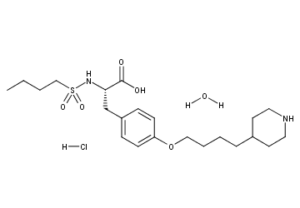Tirofiban HCl CAS NO 150915-40-5 Inquire about Tirofiban HCl
Tecoland supplies Tirofiban HCl bulk active pharmaceutical ingredient (API) to the pharmaceutical industry. Our Tirofiban HCl is manufactured by cGMP compliant facility. Welcome to contact us for further details including current DMF status for the product and up to date regulatory status of the manufacturing facility. We look forward to assisting you with your research and development projects.
What is tirofiban?
Tirofiban is used to prevent blood clots or heart attack in people with severe chest pain or other conditions, and in those who are undergoing a procedure called angioplasty (to open blocked arteries).
Tirofiban may also be used for purposes not listed in this medication guide.
Important Information
You should not receive tirofiban if you have any active internal bleeding (stomach, intestines, etc), a history of bleeding or blood-clotting disorder, if you have ever had low blood platelets after being treated with tirofiban, or if you have had any type of surgery, injury, or medical emergency within the past 30 days.
Before taking this medicine
You should not be treated with tirofiban if you are allergic to it, or if you have:
- any active internal bleeding (stomach, intestines, etc);
- a history of bleeding or blood-clotting disorder;
- if you have ever had low blood platelets after being treated with tirofiban; or
- if you have had any type of surgery, injury, or medical emergency within the past 30 days.
Tell your doctor if you have ever had:
- kidney disease.
Tell your doctor if you are pregnant or plan to become pregnant during treatment, especially if you are also taking aspirin.
You should not breast-feed while using this medicine.
How is tirofiban given?
Tirofiban is given as an infusion into a vein. A healthcare provider will give you this injection.
While using tirofiban, you may need frequent blood tests.
What happens if I miss a dose?
Because you will receive tirofiban in a clinical setting, you are not likely to miss a dose.
What happens if I overdose?
Since this medication is given by a healthcare professional in a medical setting, an overdose is unlikely to occur.
What should I avoid while receiving tirofiban?
Ask your doctor before taking a nonsteroidal anti-inflammatory drug (NSAID) such as aspirin, ibuprofen (Advil, Motrin), naproxen (Aleve), celecoxib (Celebrex), diclofenac, indomethacin, meloxicam, and others. Using an NSAID during or shortly after treatment with tirofiban may cause you to bruise or bleed easily.
Avoid activities that may increase your risk of bleeding or injury. Use extra care to prevent bleeding while shaving or brushing your teeth.
Avoid drinking alcohol while receiving tirofiban. Alcohol may increase your risk of bleeding in your stomach or intestines.
Tirofiban side effects
Get emergency medical help if you have signs of an allergic reaction: hives; difficulty breathing; swelling of your face, lips, tongue, or throat.
Tirofiban increases your risk of bleeding, which can be severe or life-threatening. Call your doctor or seek emergency medical attention if you have:
- easy bruising or bleeding (nosebleeds, bleeding gums);
- bleeding around your IV or catheter; or
- any bleeding that will not stop.
You may also have bleeding on the inside of your body, such as in your stomach or intestines. Call your doctor at once if you have bloody or tarry stools, or if you cough up blood or vomit that looks like coffee grounds. These could be signs of bleeding in your digestive tract.
Common side effects may include:
- dizziness;
- slow heart rate;
- leg pain, pelvic pain; or
- swelling, increased sweating.
This is not a complete list of side effects and others may occur. Call your doctor for medical advice about side effects. You may report side effects to FDA at 1-800-FDA-1088.
Tirofiban dosing information
Usual Adult Dose for Acute Coronary Syndrome:
Initial dose: 25 mcg/kg IV within 5 minutes
Maintenance dose: 0.15 mcg/kg/min IV infusion for up to 18 hours
Use: To reduce the rate of thrombotic cardiovascular events in patients with non-ST elevation acute coronary syndrome (NSTE-ACS).
What other drugs will affect tirofiban?
Tell your doctor about all your other medicines, especially:
- clopidogrel, ticlopidine,
- dalteparin, enoxaparin, tinzaparin;
- desirudin, dabigatran, fondaparinux.
- dipyridamole; or
- warfarin, Coumadin, Jantoven.
This list is not complete. Other drugs may affect tirofiban, including prescription and over-the-counter medicines, vitamins, and herbal products. Not all possible drug interactions are listed here.
Disclaimer:
Information on this page is provided for general information purposes. You should not make a clinical treatment decision based on information contained in this page without consulting other references including the package insert of the drug, textbooks and where relevant, expert opinion. We cannot be held responsible for any errors you make in administering drugs mentioned on this page, nor for use of any erroneous information contained on this page.
External Link:
Tirofiban. (n.d.). Drugs.Com. https://www.drugs.com/mtm/tirofiban.html